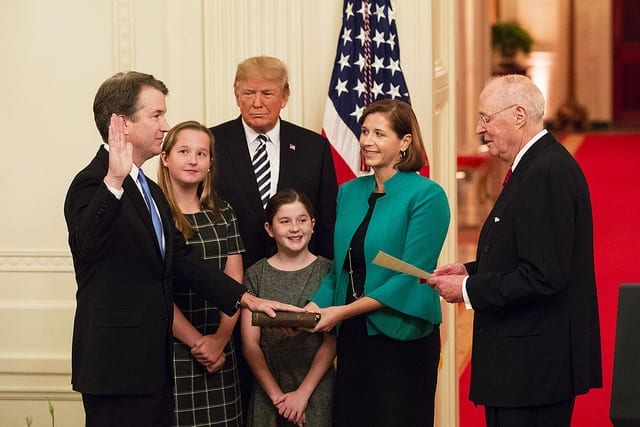Brett Kavanaugh is a Supreme Court Justice. Now What?
What lies ahead for the U.S. Supreme Court with newly appointed Justice Kavanaugh?

Last month, Brett Kavanaugh became the 114th Justice of the U.S. Supreme Court after his historic Senate Judicial hearings.
Following his initial Senate hearings, Kavanaugh answered questions about a sexual misconduct allegation during an additional day of hearings. After a delayed vote, Kavanaugh became a Supreme Court Justice with a 50 to 48 vote from the Senate.
Kavanaugh graduated from Yale Law School in 1990. After working with an independent counsel during the investigation of former president Bill Clinton, he joined the White House staff under George W. Bush as counsel and staff secretary. Since 2006, Kavanaugh has served as a judge on the U.S. Court of Appeals for the District of Columbia Circuit.
The Supreme Court will now have five conservative-leaning judges and four liberal-leaning judges. So, what does a fifth conservative judge on the Supreme Court mean?
Roe V. Wade
In 1973, the Supreme Court decided in Roe v. Wade that it was a women’s constitutional right to have access to a safe and legal abortion. Typically, conservative-leaning politicians do not agree with the Roe v. Wade decision.
“As a general proposition, I understand the importance of the precedent set forth in Roe v. Wade,” Kavanaugh said, during his third day of Senate Judiciary hearings when asked about abortion.
However, in an email that was sent in 2003, Kavanaugh wrote that he isn’t sure that all legal scholars refer to Roe as settled law at the Supreme Court level since it can always overrule its precedent. In 2017, Kavanaugh also dissented in a U.S. Appeals Court decision ordering the current administration to temporarily release an undocumented 17-year-old from custody, so that she could get an abortion.
Abortion laws would become the states’ rights if Roe v. Wade is overturned.
Ben Barton, a law professor at the University of Tennessee, discussed his personal opinion of the future of Roe V. Wade.
“I don’t think Roe v. Wade will be overturned. I think current laws will become more restrictive,” Barton said.
Too Partisan?
Kavanaugh being too partisan and not believing a president should go through a criminal investigation is another concern from those who believe President Trump should be investigated during his presidency.
Kavanaugh worked with Ken Starr who took over the independent counsel investigation into Clinton. In 1998, Kavanaugh said that he doesn’t know if Congress or an independent counsel should investigate a sitting president.
Kavanaugh was nominated for the D.C. Court of Appeals in 2003 but wasn’t confirmed by the Senate until 2006. Democratic senators accused him of being too partisan.
Dwight Aarons, a law professor at the University of Tennessee, discussed not knowing exactly how Kavanaugh will vote.
“The best test of whether he is or was too partisan, or will be on the Supreme Court, is his record as an appellate court judge on the D.C. Circuit,” Aarons said.
Supreme Court justices have voted against their political ideologies in the past. For example, William Rehnquist was appointed to the Supreme Court with the understanding that he would help overrule Miranda v. Arizona. He had the opportunity to do so, but Rehenquist didn’t.
“I don’t think he will care who the parties are; he will vote as he deems best based on his understanding of the law,” Aarons said. “He knows that his decisions will impact future presidents, regardless of party affiliation.”
Gun Control
In 2008, the D.C. v. Heller court case allowed the court to declare that the Second Amendment right to bear arms was meant to protect an individual’s right to own a gun for self-defense in their home. The court’s majority opinion said some gun regulations should include banning guns from government buildings, and preventing the mentally ill and criminals from obtaining a firearm.
The court has left a lot unsaid about gun control–-including gun registration and waiting periods to purchase guns.
Kavanaugh showed he was in favor of gun rights when referring to his decisions on the U.S. Court of Appeals for the District of Columbia.
In a dissent from a decision that upheld a D.C. ban on “assault weapons,” Kavanaugh compared a ban on a class of arms to be equivalent to a ban on a category of speech.
Only Time Will Tell
In the wake of a nation surrounded by the “Me Too” movement, Kavanaugh’s confirmation into the U.S. Supreme Court sparked both praise and backlash throughout the country.
Regardless, the public eye will focus on him, as it has with other Supreme Court justices, as he begins the next stage of his career in the Supreme Court.
Featured image by The White House
Edited by Vanessa Rodriguez, Chelsea Babin, and Kaitlin Flippo

